Deck 2: Functions
Question
Question
Question
Question
Question
Question
Question
Question
Question
Question
Question
Question
Question
Question
Question
Question
Question
Question
Question
Question
Question
Question
Question
Question
Question
Question
Question
Question
Question
Question
Question
Question
Question
Question
Question
Question
Question
Question
Question
Question
Question
Question
Question
Question
Question
Question
Question
Question
Question
Question
Question
Question
Question
Question
Question
Question
Question
Question
Question
Question
Question
Question
Question
Question
Question
Question
Question
Question
Question
Question
Question
Question
Question
Question
Question
Question
Question
Question
Question
Question

Unlock Deck
Sign up to unlock the cards in this deck!
Unlock Deck
Unlock Deck
1/98
Play
Full screen (f)
Deck 2: Functions
1
Find the domain of the function  .
.
 .
.There is no value of  that makes the denominator
that makes the denominator  , thus the domain is all real numbers
, thus the domain is all real numbers  .
.
 that makes the denominator
that makes the denominator  , thus the domain is all real numbers
, thus the domain is all real numbers  .
. 2
Determine if the equation  defines
defines  as a function of
as a function of  . Explain your answer.
. Explain your answer.
 defines
defines  as a function of
as a function of  . Explain your answer.
. Explain your answer.



 or
or  . No. Since this equation gives two values of
. No. Since this equation gives two values of  for a given value of
for a given value of  , the given equation does not define a function of
, the given equation does not define a function of  .
. 3
Complete the table for the function  .
.
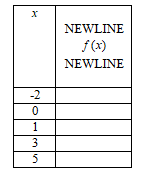
 .
.
x 
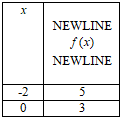




4
Express the rule in function notation. Multiply by , then subtract .
A)
B)
C)
D)
E)
A)
B)
C)
D)
E)

Unlock Deck
Unlock for access to all 98 flashcards in this deck.
Unlock Deck
k this deck
5
Let  .
.
(a) Sketch the graph of .
.
(b) Find the domain of .
.
(c) State the intervals on which is increasing and on which
is increasing and on which  is decreasing.
is decreasing.
 .
.(a) Sketch the graph of
 .
.(b) Find the domain of
 .
.(c) State the intervals on which
 is increasing and on which
is increasing and on which  is decreasing.
is decreasing.
Unlock Deck
Unlock for access to all 98 flashcards in this deck.
Unlock Deck
k this deck
6
If  , find
, find  ,
,  ,
,  ,
,  , and
, and  .
.
 , find
, find  ,
,  ,
,  ,
,  , and
, and  .
.
Unlock Deck
Unlock for access to all 98 flashcards in this deck.
Unlock Deck
k this deck
7
Evaluate  ,
,  ,
,  ,
,  , and
, and  for the piecewise-defined function.
for the piecewise-defined function. 
 ,
,  ,
,  ,
,  , and
, and  for the piecewise-defined function.
for the piecewise-defined function. 

Unlock Deck
Unlock for access to all 98 flashcards in this deck.
Unlock Deck
k this deck
8
For the function  , find
, find  and
and  .
.
 , find
, find  and
and  .
.
Unlock Deck
Unlock for access to all 98 flashcards in this deck.
Unlock Deck
k this deck
9
Express the rule in function notation.
Square, subtract , then take the square root.
A)
B)
C)
D)
E)
Square, subtract , then take the square root.
A)
B)
C)
D)
E)

Unlock Deck
Unlock for access to all 98 flashcards in this deck.
Unlock Deck
k this deck
10
Find the domain of the function  .
.
 .
.
Unlock Deck
Unlock for access to all 98 flashcards in this deck.
Unlock Deck
k this deck
11
State whether the curve is the graph of a function. If it is, state the domain and range of the function. ![<strong>State whether the curve is the graph of a function. If it is, state the domain and range of the function. </strong> A) Function, domain [ - 2,2 ) , range ( - 4,4 ) B) Function, domain [ - 2,2 ] , range [ - 4,4 ] C) Function, domain ( - 2,2 ) , range ( - 4,4 ) D) Function, domain ( - 4,4 ) , range ( - 2,2 ) E) Not a function](https://storage.examlex.com/TB5970/11eaa4aa_a9d3_3c9b_9e4a_8798b0fdaa31_TB5970_00.jpg)
A) Function, domain , range
B) Function, domain , range
C) Function, domain , range
D) Function, domain , range
E) Not a function
![<strong>State whether the curve is the graph of a function. If it is, state the domain and range of the function. </strong> A) Function, domain [ - 2,2 ) , range ( - 4,4 ) B) Function, domain [ - 2,2 ] , range [ - 4,4 ] C) Function, domain ( - 2,2 ) , range ( - 4,4 ) D) Function, domain ( - 4,4 ) , range ( - 2,2 ) E) Not a function](https://storage.examlex.com/TB5970/11eaa4aa_a9d3_3c9b_9e4a_8798b0fdaa31_TB5970_00.jpg)
A) Function, domain , range
B) Function, domain , range
C) Function, domain , range
D) Function, domain , range
E) Not a function

Unlock Deck
Unlock for access to all 98 flashcards in this deck.
Unlock Deck
k this deck
12
Determine if the equation  defines
defines  as a function of
as a function of  . Explain your answer.
. Explain your answer.
 defines
defines  as a function of
as a function of  . Explain your answer.
. Explain your answer.
Unlock Deck
Unlock for access to all 98 flashcards in this deck.
Unlock Deck
k this deck
13
If  , find
, find  ,
,  ,
,  .
.
 , find
, find  ,
,  ,
,  .
.
Unlock Deck
Unlock for access to all 98 flashcards in this deck.
Unlock Deck
k this deck
14
If  , find
, find  ,
,  ,
,  .
.
 , find
, find  ,
,  ,
,  .
.
Unlock Deck
Unlock for access to all 98 flashcards in this deck.
Unlock Deck
k this deck
15
If  , find
, find  ,
,  ,
,  .
.
 , find
, find  ,
,  ,
,  .
.
Unlock Deck
Unlock for access to all 98 flashcards in this deck.
Unlock Deck
k this deck
16
Let  .
.
(a) Sketch the graph of .
.
(b) Find the domain and the range of .
.
 .
.(a) Sketch the graph of
 .
.(b) Find the domain and the range of
 .
.
Unlock Deck
Unlock for access to all 98 flashcards in this deck.
Unlock Deck
k this deck
17
Determine if the equation  defines
defines  as a function of
as a function of  . Explain your answer.
. Explain your answer.
 defines
defines  as a function of
as a function of  . Explain your answer.
. Explain your answer.
Unlock Deck
Unlock for access to all 98 flashcards in this deck.
Unlock Deck
k this deck
18
Determine whether the given curve is the graph of a function of . If it is, state the domain and range of the function. 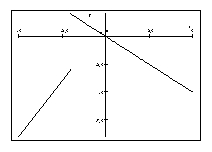
A) Function, domain: , range:
B) Function, domain: , range:
C) Function, domain: , range:
D) Function, domain: , range:
E) Not a function

A) Function, domain: , range:
B) Function, domain: , range:
C) Function, domain: , range:
D) Function, domain: , range:
E) Not a function

Unlock Deck
Unlock for access to all 98 flashcards in this deck.
Unlock Deck
k this deck
19
The cost  in dollars to manufacture
in dollars to manufacture  integrated circuits is given by the function
integrated circuits is given by the function  , where
, where  is measured in hundreds.
is measured in hundreds.
(a) Find and
and  .
.
(b) What do the answers in part (a) represent?
 in dollars to manufacture
in dollars to manufacture  integrated circuits is given by the function
integrated circuits is given by the function  , where
, where  is measured in hundreds.
is measured in hundreds. (a) Find
 and
and  .
. (b) What do the answers in part (a) represent?

Unlock Deck
Unlock for access to all 98 flashcards in this deck.
Unlock Deck
k this deck
20
Determine whether the given curve is the graph of a function of . If it is, state the domain and range of the function. 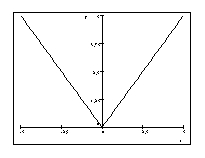
A) Function, domain: , range:
B) Function, domain: range:
C) Function, domain: , range:
D) Function, domain: , range:
E) Not a function

A) Function, domain: , range:
B) Function, domain: range:
C) Function, domain: , range:
D) Function, domain: , range:
E) Not a function

Unlock Deck
Unlock for access to all 98 flashcards in this deck.
Unlock Deck
k this deck
21
Use a graphing device to the graph of the function  . State approximately the intervals on which the function is increasing and on which the function is decreasing.
. State approximately the intervals on which the function is increasing and on which the function is decreasing.
 . State approximately the intervals on which the function is increasing and on which the function is decreasing.
. State approximately the intervals on which the function is increasing and on which the function is decreasing.
Unlock Deck
Unlock for access to all 98 flashcards in this deck.
Unlock Deck
k this deck
22
Sketch the graph of the piecewise-defined function. 


Unlock Deck
Unlock for access to all 98 flashcards in this deck.
Unlock Deck
k this deck
23
Let  . Graph the family of functions with
. Graph the family of functions with  ,
,  ,
,  ,
,  , and
, and  in the viewing rectangle
in the viewing rectangle  by
by  . How does the value of
. How does the value of  affect the graph?
affect the graph?
 . Graph the family of functions with
. Graph the family of functions with  ,
,  ,
,  ,
,  , and
, and  in the viewing rectangle
in the viewing rectangle  by
by  . How does the value of
. How does the value of  affect the graph?
affect the graph?
Unlock Deck
Unlock for access to all 98 flashcards in this deck.
Unlock Deck
k this deck
24
Use a graphing device to draw the graph of the function  . State approximately the intervals on which the function is increasing and on which the function is decreasing.
. State approximately the intervals on which the function is increasing and on which the function is decreasing.
 . State approximately the intervals on which the function is increasing and on which the function is decreasing.
. State approximately the intervals on which the function is increasing and on which the function is decreasing.
Unlock Deck
Unlock for access to all 98 flashcards in this deck.
Unlock Deck
k this deck
25
Let  . Graph the family of functions with
. Graph the family of functions with  ,
,  ,
,  ,
,  , and
, and  in the viewing rectangle
in the viewing rectangle  by
by  . How does the value of
. How does the value of  affect the graph?
affect the graph?
 . Graph the family of functions with
. Graph the family of functions with  ,
,  ,
,  ,
,  , and
, and  in the viewing rectangle
in the viewing rectangle  by
by  . How does the value of
. How does the value of  affect the graph?
affect the graph?
Unlock Deck
Unlock for access to all 98 flashcards in this deck.
Unlock Deck
k this deck
26
Graphs of the functions f and g are given.
(a) Which is larger,
(b) Which is larger,
(c) For which values of x is
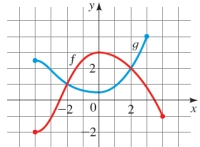
(a) Which is larger,

(b) Which is larger,

(c) For which values of x is



Unlock Deck
Unlock for access to all 98 flashcards in this deck.
Unlock Deck
k this deck
27
The graph of a function h is given.
(a) Find
(b) Find the domain and range of h.
(c) Find the values of x for which
(d) Find the values of x for which
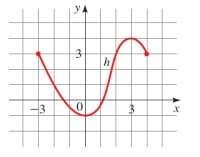
(a) Find

(b) Find the domain and range of h.
(c) Find the values of x for which

(d) Find the values of x for which



Unlock Deck
Unlock for access to all 98 flashcards in this deck.
Unlock Deck
k this deck
28
The graph of a function is given. Find the intervals on which the function is increasing and decreasing. ![<strong>The graph of a function is given. Find the intervals on which the function is increasing and decreasing. </strong> A) Increasing on [ - 1,1 ] ; [ 3 , \infty ) ; decreasing on ( - \infty , - 1 ] , [ 1,3 ] B) Increasing on [ - 1,1 ] ; decreasing on ( - \infty , - 1 ] C) Increasing on [ - 4,1 ] ; decreasing on [ 0 , - 4 ] D) Increasing on [ - 4,1 ] ; decreasing on [ - 4,0 ] E) Increasing on [ - 1,1 ] , [ 3 , \infty ) ; decreasing on [ 6 , - 4 ] , [ - 4,0 ]](https://storage.examlex.com/TB5970/11eaa4aa_a9d6_e68f_9e4a_a3654f70b3b4_TB5970_00.jpg)
A) Increasing on
;
; decreasing on
,
B) Increasing on
; decreasing on
C) Increasing on
; decreasing on
D) Increasing on
; decreasing on
E) Increasing on
,
; decreasing on
,
![<strong>The graph of a function is given. Find the intervals on which the function is increasing and decreasing. </strong> A) Increasing on [ - 1,1 ] ; [ 3 , \infty ) ; decreasing on ( - \infty , - 1 ] , [ 1,3 ] B) Increasing on [ - 1,1 ] ; decreasing on ( - \infty , - 1 ] C) Increasing on [ - 4,1 ] ; decreasing on [ 0 , - 4 ] D) Increasing on [ - 4,1 ] ; decreasing on [ - 4,0 ] E) Increasing on [ - 1,1 ] , [ 3 , \infty ) ; decreasing on [ 6 , - 4 ] , [ - 4,0 ]](https://storage.examlex.com/TB5970/11eaa4aa_a9d6_e68f_9e4a_a3654f70b3b4_TB5970_00.jpg)
A) Increasing on
;
; decreasing on
,
B) Increasing on
; decreasing on
C) Increasing on
; decreasing on
D) Increasing on
; decreasing on
E) Increasing on
,
; decreasing on
,

Unlock Deck
Unlock for access to all 98 flashcards in this deck.
Unlock Deck
k this deck
29
A function is given. Use a graphing calculator to draw the graph of f. Find the domain and range of f from the graph. 


Unlock Deck
Unlock for access to all 98 flashcards in this deck.
Unlock Deck
k this deck
30
Use a graphing device to draw the graph of the function  . State approximately the intervals on which the function is increasing and on which the function is decreasing.
. State approximately the intervals on which the function is increasing and on which the function is decreasing.
 . State approximately the intervals on which the function is increasing and on which the function is decreasing.
. State approximately the intervals on which the function is increasing and on which the function is decreasing.
Unlock Deck
Unlock for access to all 98 flashcards in this deck.
Unlock Deck
k this deck
31
A function is given. Use a graphing calculator to draw the graph of f. Find the domain and range of f from the graph. 


Unlock Deck
Unlock for access to all 98 flashcards in this deck.
Unlock Deck
k this deck
32
A function is given. Use a graphing calculator to draw the graph of f. Find the domain and range of f from the graph. 


Unlock Deck
Unlock for access to all 98 flashcards in this deck.
Unlock Deck
k this deck
33
A function is given. Use a graphing calculator to draw the graph of f. Find the domain and range of f from the graph. 


Unlock Deck
Unlock for access to all 98 flashcards in this deck.
Unlock Deck
k this deck
34
A function is given.
(a) Find all the local maximum and minimum values of the function and the value of x at which each occurs.
(b) Find the intervals on which the function is increasing and on which the function is decreasing. State all answers correct to two decimal places.

(a) Find all the local maximum and minimum values of the function and the value of x at which each occurs.
(b) Find the intervals on which the function is increasing and on which the function is decreasing. State all answers correct to two decimal places.


Unlock Deck
Unlock for access to all 98 flashcards in this deck.
Unlock Deck
k this deck
35
Use a graphing device to draw the graph of the function  . State approximately the intervals on which the function is increasing and on which the function is decreasing.
. State approximately the intervals on which the function is increasing and on which the function is decreasing.
 . State approximately the intervals on which the function is increasing and on which the function is decreasing.
. State approximately the intervals on which the function is increasing and on which the function is decreasing.
Unlock Deck
Unlock for access to all 98 flashcards in this deck.
Unlock Deck
k this deck
36
Let  . Graph the family of functions with
. Graph the family of functions with  ,
,  , and
, and  in the viewing rectangle
in the viewing rectangle  by
by  . How does the value of
. How does the value of  affect the graph?
affect the graph?
 . Graph the family of functions with
. Graph the family of functions with  ,
,  , and
, and  in the viewing rectangle
in the viewing rectangle  by
by  . How does the value of
. How does the value of  affect the graph?
affect the graph?
Unlock Deck
Unlock for access to all 98 flashcards in this deck.
Unlock Deck
k this deck
37
Graphs of the functions f and g are given.
(a) Which is larger,
(b) Which is larger,
(c) For which values of x is
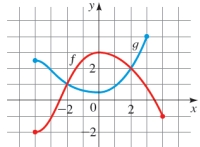
(a) Which is larger,

(b) Which is larger,

(c) For which values of x is



Unlock Deck
Unlock for access to all 98 flashcards in this deck.
Unlock Deck
k this deck
38
A function is given.
(a) Find all the local maximum and minimum values of the function and the value of x at which each occurs.
(b) Find the intervals on which the function is increasing and on which the function is decreasing. State all answers correct to two decimal places.

(a) Find all the local maximum and minimum values of the function and the value of x at which each occurs.
(b) Find the intervals on which the function is increasing and on which the function is decreasing. State all answers correct to two decimal places.


Unlock Deck
Unlock for access to all 98 flashcards in this deck.
Unlock Deck
k this deck
39
Sketch the graph of the piecewise-defined function. 


Unlock Deck
Unlock for access to all 98 flashcards in this deck.
Unlock Deck
k this deck
40
The graph of a function h is given.
(a) Find
(b) Find the domain and range of h.
(c) Find the values of x for which
(d) Find the values of x for which
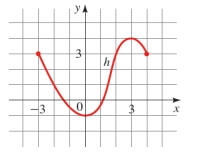
(a) Find

(b) Find the domain and range of h.
(c) Find the values of x for which

(d) Find the values of x for which



Unlock Deck
Unlock for access to all 98 flashcards in this deck.
Unlock Deck
k this deck
41
The graph of a function is given. Determine the average rate of change of the function between the indicated points on the graph.




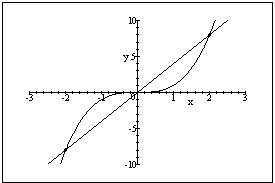






Unlock Deck
Unlock for access to all 98 flashcards in this deck.
Unlock Deck
k this deck
42
For the function  determine the average rate of change between the values
determine the average rate of change between the values  and
and  .
.
 determine the average rate of change between the values
determine the average rate of change between the values  and
and  .
.
Unlock Deck
Unlock for access to all 98 flashcards in this deck.
Unlock Deck
k this deck
43
A man is running around a circular track that is 200 m in circumference. An observer uses a stopwatch to record the runner's time at the end of each lap, obtaining the data in the following table.
What was the man's average speed (rate) between 108 s and 203 s? Round the answer to two decimal places.
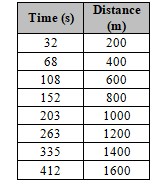
What was the man's average speed (rate) between 108 s and 203 s? Round the answer to two decimal places.


Unlock Deck
Unlock for access to all 98 flashcards in this deck.
Unlock Deck
k this deck
44
For the function  determine the average rate of change between the values
determine the average rate of change between the values  and
and  .
.
 determine the average rate of change between the values
determine the average rate of change between the values  and
and  .
.
Unlock Deck
Unlock for access to all 98 flashcards in this deck.
Unlock Deck
k this deck
45
For the function  determine the average rate of change between the values
determine the average rate of change between the values  and
and  .
.
 determine the average rate of change between the values
determine the average rate of change between the values  and
and  .
.
Unlock Deck
Unlock for access to all 98 flashcards in this deck.
Unlock Deck
k this deck
46
A man is running around a circular track that is 200 m in circumference. An observer uses a stopwatch to record the runner's time at the end of each lap, obtaining the data in the following table.
What was the man's average speed (rate) between 68 s and 203 s? Round the answer to two decimal places.

What was the man's average speed (rate) between 68 s and 203 s? Round the answer to two decimal places.


Unlock Deck
Unlock for access to all 98 flashcards in this deck.
Unlock Deck
k this deck
47
The graph of a function is given. Determine the average rate of change of the function between the indicated points on the graph. 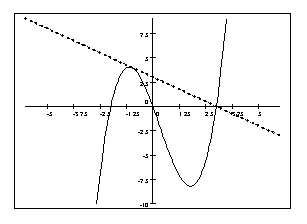


Unlock Deck
Unlock for access to all 98 flashcards in this deck.
Unlock Deck
k this deck
48
For the function  determine the average rate of change between the values
determine the average rate of change between the values  and
and 
 determine the average rate of change between the values
determine the average rate of change between the values  and
and 

Unlock Deck
Unlock for access to all 98 flashcards in this deck.
Unlock Deck
k this deck
49
For the function  determine the average rate of change between the values
determine the average rate of change between the values  and
and  .
.
 determine the average rate of change between the values
determine the average rate of change between the values  and
and  .
.
Unlock Deck
Unlock for access to all 98 flashcards in this deck.
Unlock Deck
k this deck
50
The graph shows the depth of water W in a reservoir over a one-year period as a function of the number of days x since the beginning of the year. What was the average rate of change of W between x = 0 and x= 100?

Unlock Deck
Unlock for access to all 98 flashcards in this deck.
Unlock Deck
k this deck
51
For the function  determine the average rate of change between the values
determine the average rate of change between the values  and
and  .
.
 determine the average rate of change between the values
determine the average rate of change between the values  and
and  .
.
Unlock Deck
Unlock for access to all 98 flashcards in this deck.
Unlock Deck
k this deck
52
For the function  determine the average rate of change between the values
determine the average rate of change between the values  and
and  (
(  ).
).
 determine the average rate of change between the values
determine the average rate of change between the values  and
and  (
(  ).
).
Unlock Deck
Unlock for access to all 98 flashcards in this deck.
Unlock Deck
k this deck
53
Given the graph of , describe how the graph of can be obtained from the graph of
A) Stretch horizontally by a factor of , then reflecting about the
- axis, then shifting
units up
B) Shrink vertically by a factor of , then reflecting about the
- axis, then shifting
units up.
C) Stretch horizontally by a factor of , then reflecting about the
- axis, then shifting
units up .
D) Shrink vertically by a factor of , then reflecting about the
- axis, then shifting downward
units.
E) Shrink horizontally by a factor of , then reflecting about the
- axis, then shifting
units up
A) Stretch horizontally by a factor of , then reflecting about the
- axis, then shifting
units up
B) Shrink vertically by a factor of , then reflecting about the
- axis, then shifting
units up.
C) Stretch horizontally by a factor of , then reflecting about the
- axis, then shifting
units up .
D) Shrink vertically by a factor of , then reflecting about the
- axis, then shifting downward
units.
E) Shrink horizontally by a factor of , then reflecting about the
- axis, then shifting
units up

Unlock Deck
Unlock for access to all 98 flashcards in this deck.
Unlock Deck
k this deck
54
For the function  determine the average rate of change between the values
determine the average rate of change between the values  and
and 
 determine the average rate of change between the values
determine the average rate of change between the values  and
and 

Unlock Deck
Unlock for access to all 98 flashcards in this deck.
Unlock Deck
k this deck
55
The graph shows the depth of water W in a reservoir over a one-year period as a function of the number of days x since the beginning of the year. Estimate the average rate of change of W between x = 200 and x= 300.

Unlock Deck
Unlock for access to all 98 flashcards in this deck.
Unlock Deck
k this deck
56
Given the graph of describe how the graph of can be obtained from the graph of
A) Shift units to the right, then stretching vertically by a factor of
, then shift upward
units.
B) Shift units to the right, then shrinking horizontally by a factor of
, then shift downward
units.
C) Shift units to the left, then shrinking vertically by a factor of
, then shift upward
units.
D) Shift units to the right, then stretching vertically by a factor of
, then shift upward
units.
E) Shift units to the left, then shrinking vertically by a factor of
, then shift upward
units.
A) Shift units to the right, then stretching vertically by a factor of
, then shift upward
units.
B) Shift units to the right, then shrinking horizontally by a factor of
, then shift downward
units.
C) Shift units to the left, then shrinking vertically by a factor of
, then shift upward
units.
D) Shift units to the right, then stretching vertically by a factor of
, then shift upward
units.
E) Shift units to the left, then shrinking vertically by a factor of
, then shift upward
units.

Unlock Deck
Unlock for access to all 98 flashcards in this deck.
Unlock Deck
k this deck
57
The graph shows the depth of water W in a reservoir over a one-year period as a function of the number of days x since the beginning of the year. What was the average rate of change of W between x = 100 and x= 200?

Unlock Deck
Unlock for access to all 98 flashcards in this deck.
Unlock Deck
k this deck
58
A function is given.
(a) Find all the local maximum and minimum values of the function and the value of x at which each occurs.
(b) Find the intervals on which the function is increasing and on which the function is decreasing. State all answers correct to two decimal places.

(a) Find all the local maximum and minimum values of the function and the value of x at which each occurs.
(b) Find the intervals on which the function is increasing and on which the function is decreasing. State all answers correct to two decimal places.


Unlock Deck
Unlock for access to all 98 flashcards in this deck.
Unlock Deck
k this deck
59
A function is given.
(a) Find all the local maximum and minimum values of the function and the value of x at which each occurs.
(b) Find the intervals on which the function is increasing and on which the function is decreasing. State all answers correct to two decimal places.

(a) Find all the local maximum and minimum values of the function and the value of x at which each occurs.
(b) Find the intervals on which the function is increasing and on which the function is decreasing. State all answers correct to two decimal places.


Unlock Deck
Unlock for access to all 98 flashcards in this deck.
Unlock Deck
k this deck
60
For the linear function  , find the average rate of change between
, find the average rate of change between  and
and  . Show that the average rate of change is the same as the slope of the line.
. Show that the average rate of change is the same as the slope of the line.
 , find the average rate of change between
, find the average rate of change between  and
and  . Show that the average rate of change is the same as the slope of the line.
. Show that the average rate of change is the same as the slope of the line.
Unlock Deck
Unlock for access to all 98 flashcards in this deck.
Unlock Deck
k this deck
61
Let  and
and  . Find
. Find  ,
,  and their domains.
and their domains.
 and
and  . Find
. Find  ,
,  and their domains.
and their domains.
Unlock Deck
Unlock for access to all 98 flashcards in this deck.
Unlock Deck
k this deck
62
The graph of  is shown. Use this graph to sketch the graph of
is shown. Use this graph to sketch the graph of  .
. 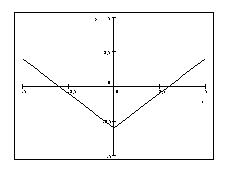
 is shown. Use this graph to sketch the graph of
is shown. Use this graph to sketch the graph of  .
. 

Unlock Deck
Unlock for access to all 98 flashcards in this deck.
Unlock Deck
k this deck
63
Determine whether  is even or odd. If
is even or odd. If  is even or odd, use symmetry to sketch its graph.
is even or odd, use symmetry to sketch its graph.
 is even or odd. If
is even or odd. If  is even or odd, use symmetry to sketch its graph.
is even or odd, use symmetry to sketch its graph.
Unlock Deck
Unlock for access to all 98 flashcards in this deck.
Unlock Deck
k this deck
64
Let  and
and  . Find
. Find  ,
,  , and their domains.
, and their domains.
 and
and  . Find
. Find  ,
,  , and their domains.
, and their domains.
Unlock Deck
Unlock for access to all 98 flashcards in this deck.
Unlock Deck
k this deck
65
Given  ,
,  , and
, and  , find
, find  .
.
 ,
,  , and
, and  , find
, find  .
.
Unlock Deck
Unlock for access to all 98 flashcards in this deck.
Unlock Deck
k this deck
66
Graph the given functions on the same screen using the viewing rectangle  by
by  . How is each part related to the graph in part
. How is each part related to the graph in part
(a)

(a)?
(b)

(c)

(d)

 by
by  . How is each part related to the graph in part
. How is each part related to the graph in part (a)

(a)?
(b)

(c)

(d)


Unlock Deck
Unlock for access to all 98 flashcards in this deck.
Unlock Deck
k this deck
67
Given  and
and  , find
, find  ,
,  ,
,  , and
, and  , and their domains.
, and their domains.
 and
and  , find
, find  ,
,  ,
,  , and
, and  , and their domains.
, and their domains.
Unlock Deck
Unlock for access to all 98 flashcards in this deck.
Unlock Deck
k this deck
68
Use and to evaluate the expression .
A)
B)
C)
D)
E)
A)
B)
C)
D)
E)

Unlock Deck
Unlock for access to all 98 flashcards in this deck.
Unlock Deck
k this deck
69
Sketch the graph of the function  , not by plotting points, but by starting with the graph of a standard function and applying transformations.
, not by plotting points, but by starting with the graph of a standard function and applying transformations.
 , not by plotting points, but by starting with the graph of a standard function and applying transformations.
, not by plotting points, but by starting with the graph of a standard function and applying transformations.
Unlock Deck
Unlock for access to all 98 flashcards in this deck.
Unlock Deck
k this deck
70
For the functions  and
and  , find
, find  ,
,  ,
,  ,
,  and their domains.
and their domains. 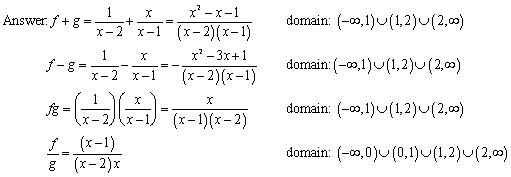 10.
10.
Given and
and  , find
, find  .
.
 and
and  , find
, find  ,
,  ,
,  ,
,  and their domains.
and their domains.  10.
10.Given
 and
and  , find
, find  .
.
Unlock Deck
Unlock for access to all 98 flashcards in this deck.
Unlock Deck
k this deck
71
If  and
and  , find
, find  ,
,  , and their domains.
, and their domains.
 and
and  , find
, find  ,
,  , and their domains.
, and their domains.
Unlock Deck
Unlock for access to all 98 flashcards in this deck.
Unlock Deck
k this deck
72
Use and to evaluate the expression .
A)
B)
C)
D)
E)
A)
B)
C)
D)
E)

Unlock Deck
Unlock for access to all 98 flashcards in this deck.
Unlock Deck
k this deck
73
Explain how the graph of is obtained from the graph of .
A) Shift the graph of one unit to the right, then shift downward
units.
B) Shift the graph of one unit to the right, then shift downward
units.
C) Shift the graph of one unit to the left, then shrink vertically by a factor of
.
D) Shift the graph of one unit to the left, then shift upward
units.
E) Shift the graph of one unit to the left, shrink vertically by a factor of
, shift downward
units.
A) Shift the graph of one unit to the right, then shift downward
units.
B) Shift the graph of one unit to the right, then shift downward
units.
C) Shift the graph of one unit to the left, then shrink vertically by a factor of
.
D) Shift the graph of one unit to the left, then shift upward
units.
E) Shift the graph of one unit to the left, shrink vertically by a factor of
, shift downward
units.

Unlock Deck
Unlock for access to all 98 flashcards in this deck.
Unlock Deck
k this deck
74
Use and to evaluate the expression .
A)
B)
C)
D)
E)
A)
B)
C)
D)
E)

Unlock Deck
Unlock for access to all 98 flashcards in this deck.
Unlock Deck
k this deck
75
Shift the graph of by units to the left and then units downward, and choose the equation for the final transformed graph.
A)
B)
C)
D)
E)
A)
B)
C)
D)
E)

Unlock Deck
Unlock for access to all 98 flashcards in this deck.
Unlock Deck
k this deck
76
Use and to evaluate the expression .
A)
B)
C)
D)
E)
A)
B)
C)
D)
E)

Unlock Deck
Unlock for access to all 98 flashcards in this deck.
Unlock Deck
k this deck
77
Use and to evaluate the expression .
A)
B)
C)
D)
E)
A)
B)
C)
D)
E)

Unlock Deck
Unlock for access to all 98 flashcards in this deck.
Unlock Deck
k this deck
78
If  and
and  , find
, find  ,
,  , and their domains.
, and their domains.
 and
and  , find
, find  ,
,  , and their domains.
, and their domains.
Unlock Deck
Unlock for access to all 98 flashcards in this deck.
Unlock Deck
k this deck
79
Explain how the graph of is obtained from the graph of
A) Shift the graph of one unit to the left, then reflect about the
- axis.
B) Shift the graph of one unit to the left, then reflect about the
- axis .
C) Shift the graph of one unit up, reflect about the
- axis and stretch vertically by a factor of
.
D) Shift the graph of one unit to the left, then reflect about the
- axis.
E) Shift the graph of one unit down, reflect about the
- axis and stretch vertically by a factor of
A) Shift the graph of one unit to the left, then reflect about the
- axis.
B) Shift the graph of one unit to the left, then reflect about the
- axis .
C) Shift the graph of one unit up, reflect about the
- axis and stretch vertically by a factor of
.
D) Shift the graph of one unit to the left, then reflect about the
- axis.
E) Shift the graph of one unit down, reflect about the
- axis and stretch vertically by a factor of

Unlock Deck
Unlock for access to all 98 flashcards in this deck.
Unlock Deck
k this deck
80
If  and
and  , find
, find  ,
,  , and their domains.
, and their domains.
 and
and  , find
, find  ,
,  , and their domains.
, and their domains.
Unlock Deck
Unlock for access to all 98 flashcards in this deck.
Unlock Deck
k this deck


